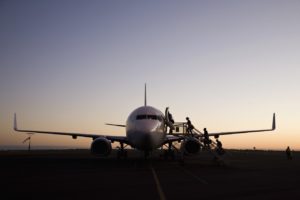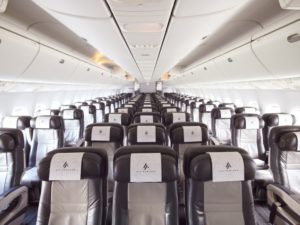Words by Ben Sampson
David McCown, president of Air Partner Americas, discusses innovation and business travel post pandemic.
Air Partner is an established name in the business aviation sector that is synonymous with corporate charter.
However, the company has made several acquisitions in the last six years, signaling a steady expansion of the services it provides into safety and security.
Providing passenger security screening or repairing baggage handling systems may initially seem very separate activities from providing corporate charter. But, as David McCown, president of Air Partner Americas explains, the acquisitions are part of a growth strategy that keeps its customers’ core requirements firmly in mind, even as those needs evolve.
“We are a publicly-traded company that can appeal to the corporates, but at the same time, we are entrepreneurial. We are a flat organization – the CEO is very approachable,” says McCown.
Supply and demand
Air Partner employs more than 420 people at 16 locations across the world and internally encourages its employees to work entrepreneurially.
A distinct characteristic of its business model within the private aviation sector is that the company does not own or operate aircraft. This can create challenges as well as benefits, says McCown: “The big advantage is that we are not beholden to a fleet of aircraft – we can take charter requests and then source aircraft, sometimes from across multiple carriers.”
“The disadvantages are the same as in the wider industry, that in a tight situation it can be hard to find available aircraft.”
At its most basic, aviation is about getting passengers from A to B. However, McCown is quick to distinguish Air Partner from the latest generation of “bedroom brokers”, who he says operate with “a very different approach” to his own company.
“It’s important to have a strong working relationship with our suppliers to understand what they are capable of and to ensure that the trips are made successfully.”
Air Partner’s suppliers are the carriers and McCown says the company “cherishes” the relationship it has with them, almost as much as it does the relationship with its customers. “We let the suppliers choose their FBO because they can leverage pre-existing contracts for fuel and services. There are exceptions, such as when a
client requests a specific FBO or for customs clearances,” he says.
Market changes

Air Partner’s corporate work is the strongest aspect of its business. “We are extremely adept at international travel, not just in Europe and the USA, but also into Africa, Asia, and Latin America,” says McCown. “Many of our customers are multilateral organizations, including government ones, that work across different parts of the world.”
McCown agrees that historically most of Air Partner’s business is B2B. But this has been changing during the last 20 years. “Business aviation has become increasingly accepted as a way to travel, whether you are a corporate or a high-net worth leisure traveler.”
“An increasing share of our business comes from individuals. That trend was supercharged by Covid-19.”
Central to this adoption is that perceptions about private aviation are changing, with an increased awareness from leisure travelers about the value that can be added to a trip by flying privately.
It was these leisure travelers that kept business aviation companies including Air Partner’s Private Jets division relatively busy last year and helped offset the drop in business travel because of the pandemic. This year Air Partner has seen corporate bookings start to increase, particularly between January and April. However, the number of bookings remains below pre-Covid levels, especially internationally.
“Domestically in the USA there are no restrictions anymore. We thought corporate bookings would bounce back between July and September, but it has been sooner than that,” says McCown. “But there is still a drag from international business travel. There just isn’t much demand for it right now.”
Longer term, prospects for corporate bookings are mainly dependent on how airlines change their schedules and seating allocations for business travelers, believes McCown. Private aviation will be well-placed to benefit if airlines shed business travelers. “Increasingly, private aviation will be the only choice if you want to travel and be productive,” he says.
Corporate shuttles and control

The company also specializes in providing group charter and aviation services, including evacuation missions from high-risk areas. The risks could be political, natural disasters, or pandemics.
Last year, while the Private Jets business was down, Group Charter was up, because of the transport of large groups of people and the movement of personal perspective equipment. Recent acquisition Redline, which provides global security solutions, integrated security screening services into the Group Charter service to help repatriate UK and Irish nationals onboard a cruise ship quarantined off the coast of Japan. During the pandemic, Air Partner’s global team repatriated thousands of passengers to destinations such as Philippines, Indonesia, India, Mauritius, Zimbabwe, South Africa, Nicaragua, Colombia, Brazil, Buenos Aires, London, Frankfurt, and Madrid.
A similar innovation from within this part of the business is Air Partner’s corporate shuttle program, which links locations that a company’s staff travel between regularly. This could be two main offices, headquarters to a recent acquisition, or a remote site. “As schedules are pulled back, but business travelers return, a private shuttle where you are traveling to your own schedule, in your own controlled environment makes a lot of sense,” McCown says.
“There is now awareness of what a pandemic can do. You can fly in and out of a lot of FBOs in a large airliner. Minimizing touch points in public places and ensuring everyone on a flight is vaccinated or wears masks can be controlled on a private charter.”
Another example of innovation is Air Partner’s JetCard program. “It’s always been one of our most flexible and global services. It’s fully refundable. The hours never expire. It’s just what the customer wants. Flying privately is all about flexibility. We wouldn’t necessarily go and sell it to tens of thousands of people, because it wouldn’t work for us,” he says.

This kind of product innovation is typical and leverages the company’s USP compared to other large industry players. “We are not a mass-market product. We have built our business trip by trip, by being bespoke. The result is we have a diverse range of services and we are international,” McCown says.
There is little doubt that private aviation is becoming much more accessible by making the way that customers can buy and use its services easier. For example, before jet membership programs introduced fixed prices, the cost of flying privately could vary greatly on a daily basis, even between the same locations.
“The price point is still a barrier and some companies have come to market that sell seats on business aviation aircraft. We’re not against that, but if you are flying with people you don’t know, it isn’t really private,” McCown says.
McCown is keen to differentiate Air Partner from innovation that seeks to, as he terms it “commoditize” private aviation.
“There’s a lot of innovation within the marketing of private aviation services and in apps and online right now,” he says. “But our innovation will be in terms of reacting and providing flexibility on the charter side, especially as it expands into the safety and security business. We will continue to forge stronger relationships with our suppliers, enabling a better and more reliable passenger experience.
“I hope we are perceived by the sector and our customers as dependable, knowledgeable, and financially stable. These are all exceptionally important things in private aviation,” he adds.
eVTOLs and the environment
In the coming years, business aviation will face pressure to react to change in other areas of aviation, such as urban air mobility, eVTOL aircraft, and reducing the industry’s impact on the environment.
McCown is enthusiastic about the opportunities that both eVTOL aircraft and more sustainable aviation may offer the sector. As a long-time environmentalist, he believes that sustainability will continue to grow in importance over the next five years within the business aviation sector. “The flight shaming movement has an effect and technology, government policy and consumers are starting to demand that at least carbon offsetting, or eventually electric or hydrogen aircraft are used,” he says.
Air Partner plans to upgrade to a “far reaching” carbon offsetting program soon that will cover not just flights, but also activities by the business. “The USA may be slightly behind Europe, but the US administration has put it back on the agenda. We are seeing US corporations develop environmental policies because their shareholders are demanding it.
“Aviation and private aviation will rise to the challenge of reducing its environmental impact.”





